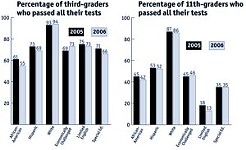Not Quite No-Kill -- Yet
As the Town Lake Animal Center nears the target date to complete its No-Kill Millennium plan, launched in 1997, most observers agree the situation has improved. Chances of meeting its goals, though, remain slim.
By Rachel Proctor May, Fri., July 19, 2002

Puppy and kitten season is here again -- the sultry months when those spring litters begin looking less cute, and more bothersome. Many of the newborns -- and hundreds of adults -- get dumped at Town Lake Animal Center, where about half of them will die. As the shelter nears the target date to complete its No-Kill Millennium plan, launched in 1997, most observers agree the situation has improved. Chances of meeting its goals, though, remain slim.
"The concept was wonderful, and a lot of good has come out of it," says Cherie Rachel, chair of the Animal Advisory Commission, which reports to the City Council. "But the city didn't put money into it, so it's been difficult to make it a complete success." The No Kill resolution, drafted by a volunteer group called Austin Pets Alive! (APA) and passed unanimously by both the city and county, called for an end to euthanasia of "adoptable" animals -- healthy, older than 8 weeks, and without behavior problems -- by 2002.
According to APA Co-President Steve Poole, TLAC administrators initially were lukewarm toward the plan. He says it was not until Dorinda Pulliam took over as director last year that the shelter began fulfilling many of its duties, including prioritizing "adoptable" animals over "treatable" or "non-rehabilitatable" ones, and spaying and neutering most animals that went out the door. A slew of nonprofit organizations, including APA, Animal Trustees of Austin, EmanciPet, and the Humane Society/SPCA, also helped find homes for animals and provide education about and access to low-cost spaying and neutering services. Because of such efforts, the number of animals arriving at the shelter has dropped from about 27,000 to around 23,000, and the kill rate last year hit 49%, down from around 70%. In other Texas cities, kill rates hover around 90%.
No one believes the shelter will eliminate euthanasia of adoptables this year, but Pulliam argues that defining success based solely on the kill rate for adoptable animals is an oversimplification. In 2002, the shelter has euthanized about 18% of its adoptable animals, she said, but only 25 to 30% of the animals are adoptable when they arrive. "That means that we could technically save all the adoptable ones and still have a much higher kill rate than what we have now," she said. But the shelter isn't doing so because giving an animal an "adoptable" ranking doesn't ensure that anyone will actually adopt it.
"We haven't reached the goal because a lot of the animals people save are in other categories," Pulliam said. "I can find a home for every three-legged dog that comes in here. There was one Dalmatian that got a hunting arrow shot clean through it and survived, and I could have adopted that dog a hundred times. But dogs like that would be classified as 'treatable,' and saving them wouldn't count toward the no-kill goal," she explains. "So although I appreciate the no-kill resolution as something to aim for, what we really have to look at is the bottom-line euthanasia rate, and in that we've done a tremendous job."
However success is measured, reducing the kill rate will require additional effort. Pulliam says a major unmet need is education about the responsibilities of pet ownership; many animals left at TLAC are adults whose owners did not understand, and grew frustrated with, the demands of a pet. Pulliam points out that the city did demonstrate a financial commitment to the plan by increasing TLAC's budget to cover 14 new positions and increasing veterinary and spay/neuter services. However, she admits that funding realities under the city's $70 million budgetary shortfall leave her with no option but to look to the volunteer community for education activities.
Nevertheless, even those who feel that the city shouldn't depend on volunteers to meet its animal welfare goals agree that great progress has been made, and that ultimate responsibility for TLAC's kill rate lies not in the hands of shelter employees but with the community.
"Many people are appalled when they hear that 32 animals are killed at TLAC every day, but the shelter can only find homes for so many animals," said Rachel of the city's Animal Advisory Commission. "So until the people of Austin make a commitment to responsible pet ownership, it's not going to change. This is not an animal issue, it's a people issue."
Got something to say on the subject? Send a letter to the editor.








